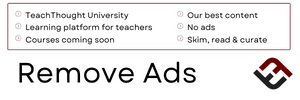Books Aren't Really Possessions You Can't Possess Knowledge or Love


24 Things A Teacher Should Never Ask A Student To Do
by TeachThought Staff
1. Meaningless work
It's fine to start with an academic standard, but standards aren't meaningful to students. Either make the work meaningful, or shelve it until you can. If you can't, ask someone in our department, building, or PLN.
If they can't, let's change the standard.
2. Read out loud if they don't want to
You'll have a pretty good instinct here who is fluent orally and who isn't. While reading aloud with fluency is indeed an important literacy standard, little good comes of forcing students to read out loud when they really, really, really don't want to.
The key may be, then, making them want to.
3. Set generic goals
Try not to ask students to get 'goals for themselves' without showing them how to make authentic, relevant, or even S.M.A.R.T. goals.
If the goal isn't as closely matched to their own human potential as possible, it's generic.
4. Confuse school with life
If you can't seamlessly merge school and the 'real world' through place-based education, project-based learning, and the like, then make a clean break. Don't mislead them that they'll need to learn Calculus to balance their check books.
5. Confront their fears for a grade
See #2.
6. Look down on their family and friends
Their friends may be shaky, and their family might at times be worse, but they're friends and family nonetheless, and in all but the most exceptional circumstances, that will be always bigger than your content area or your classroom.
7. Aspire for college without clarifying exactly why
And that doesn't mean fall back on 'to get a job.'
8. Offer uninformed opinions
Unless you're simply using that uninformed opinion as a starting point. Otherwise, don't ask them to pretend to be informed. They'll end up with an over-inflated sense of self, and a lack of respect for authentic understanding.
9. Value answers over questions
Answers serve questions, which serve learning, which serve the student. In that order.
10. Please you
If they want to make you proud, that's fine and can even be the push they need to become something great. But this can backfire, coming off like this: "Be compliant. Do what I say, when I say, how I say, and you'll be okay."
Compliance is fine, but it can't be the alpha and omega of your classroom's tone. Curiosity, interaction, and citizenship are better starting points. If they become programmed to please others, where will that lead them throughout the course of their lives? Maybe somewhere great, maybe not.
But it's a legitimate question worth asking.
11. Be something they're not
There is a thin line here between making a student feel allowing a student to think they're not smart/good readers/creative, etc., and honoring the fact that they're just not wired a certain way. Your teacher instincts should help here.
And never, ever, ever compare them to their brother, sister parents, etc., unless you're doing so in some kind of communal and loving way.
12. Make promises they can't keep
You can ask them to reach, but don't set them up to fail. And this goes for 'contracts,' too.
13. Grade one another's work
In almost all circumstances, this is a bad move. Save time some other way. Give one another feedback, yes; grade, no.
14. Compete with anyone other than themselves
Creative expression, informed individuality, and a strong sense of self-efficacy will get them further than mastering every standard on the curriculum map.
15. Tell/'snitch' on their friends
I get why this sounds like it should be okay, but it's not okay.
16. Make decisions…
…that have absolutely nothing to do with school, knowledge, wisdom, projects, etc.–dump a boyfriend or girlfriend, for example. You're probably smarter than this, but you may have an especially 'good' student dating someone especially boneheaded.
Leave this one alone.
17. Do something without modeling
If you, or peers, or others in your network can't show them how, then unless they're chomping at the bit to be intellectual pioneers, you made to rethink the work.
18. Ignore peer pressure
You do remember high school, don't you?
19. Worry
Strong teachers don't motivate students through fear. Find another approach because while it may work in spots, it's not sustainable.
Or kind.
20. Always work with partners
Collaboration is just one learning strategy. No matter how many times you hear it thrown about—or how many times you see it work—there is a time for independent thinking and planning, and a time for working together.
21. Lie to another adult
Not even a sub.
22. Dream big without showing them how
You might be surprised what they've never seen.
23. Buy things
Never make them feel like they have to spend money or have certain material possessions for your class unless you're absolutely sure they can afford it.
Update: 24 from Natalie Annabelle from our facebook community:
"Never ask a student to respond for an entire culture, religion, ethnicity, sexual orientation etc., based on perceived/known membership in group– in front of the class. Do your research ahead of time– you should never ask a student to clarify something that may not be their reality or identity. Asking a student to volunteer more of their experiences after they initially volunteered their own information is different than asking a student who looks Indian about Hinduism."
Things A Teacher Should Never Ask A Student To Do
Books Aren't Really Possessions You Can't Possess Knowledge or Love
Source: https://www.teachthought.com/pedagogy/things-teacher-never-ask/